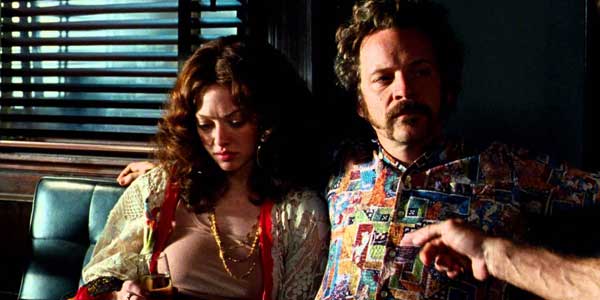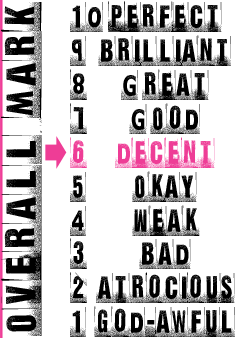
Director: Rob Epstein, Jeffrey Friedman
Running Time: 89 mins
Certificate: 18
Release Date: December 23rd 2013

How do you make a true-tale movie where the facts are in dispute? Well, you either pretend they’re not in dispute, or you try to find a way to suggest you don’t fully know what happened. Or, like Lovelace, you try to do both and trip over yourself in the process.
The film is a biopic of Linda Lovelace (Amanda Seyfried), the star of 70s porn chic hit Deep Throat, which by some reckonings is the most profitable movies ever made on the basis of budget versus its gross – however as much of the cash went through mob-controlled porn theatres, it’s impossible to know how much it actually made.
Lovelace is split into two parts. The first shows us the public face of the story – the innocent young Linda Boreman comes from a strict, straight-laced family, but after meeting and marrying Chuck Traynor (Peter Sarsgaard), her horizons are broadened and she becomes involved in porn, making a hardcore film as Linda Lovelace. Deep Throat makes her a sensation, with the film’s mainstream success leading to legit TV appearances, premieres and the high-life.
The film then jumps to six years later, when a far dowdier Linda is about to release her autobiography. We then see the story again, but this time adding in Linda’s personal side of the tale, where while those involved believed she was willingly getting involved in porn, she was actually forced into it by the controlling, violent Chuck, who thought nothing of pimping out his wife whether for the cameras or just for cash.
This structure could have been a great way to tell the tale. Although it seems clear that Chuck was indeed an asshole of epic proportions, there’s still a large amount of uncertainty over how much of a willing participant Linda was in her porn career, and whether she later exaggerated how little choice she had. Although saying that gets close to a blame-the-victim mentality, what’s not really mentioned in the movie is how after she left Chuck, Linda was essentially recruited by hardcore feminists who used her into their war against pornography. She later suggested she felt almost as manipulated and used by them as she did by the porn industry, which has led to uncertainty over how much of her autobiography is the objective truth and how much it was designed to fit the ideas of those she was involved with.
The movie realises this, so the first half is what the outside world could see, while the second half is Linda’s inside perspective. It allows the movie to suggest what you’re getting is a subjective recollection, while presenting it as the unvarnished truth, so you ultimately don’t know how you’re meant to see it. Directors Rob Epstein and Jeffrey Friedman have a background in documentaries (such as The Celluloid Closet) before they moved into feature films with Howl. You can feel them trying to keep the objective documentary idea with the two versions of the story structure, while rather undermining that with how the movie actually comes across.
It doesn’t help that while the acting is pretty good – particularly Amanda Seyfried – the script is somewhat clumsy and far less interesting than the subject matter would suggest. It uses far too many broad brushstrokes and often feels as if its indecision over whether to present certain events as absolutely true or not has resulted in it often seeming rather indecisive and as if its deliberately fudging things.
It’s a shame, as the film certainly lets you know that Linda’s is a fascinating story – whatever the objective truth of it – even if the movie perhaps isn’t the best telling of it possible. There was actually a rival project about Linda Lovelace in the works that was due to star Lindsay Lohan, however that never got off the ground. After watching Lovelace, it does make me wonder whether that movie could have done better with the material.
Overall Verdict: A fascinating true story is rendered less than it might have been due to a weak script and a structure that wants to have its cake and eat it. The film ends up undermining the power it could have had.
Reviewer: Tim Isaac





Leave a Reply (if comment does not appear immediately, it may have been held for moderation)